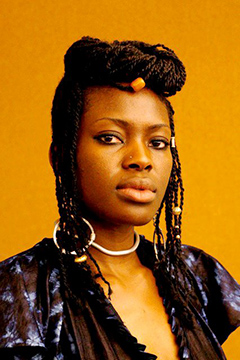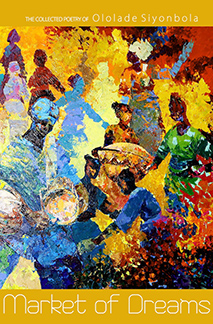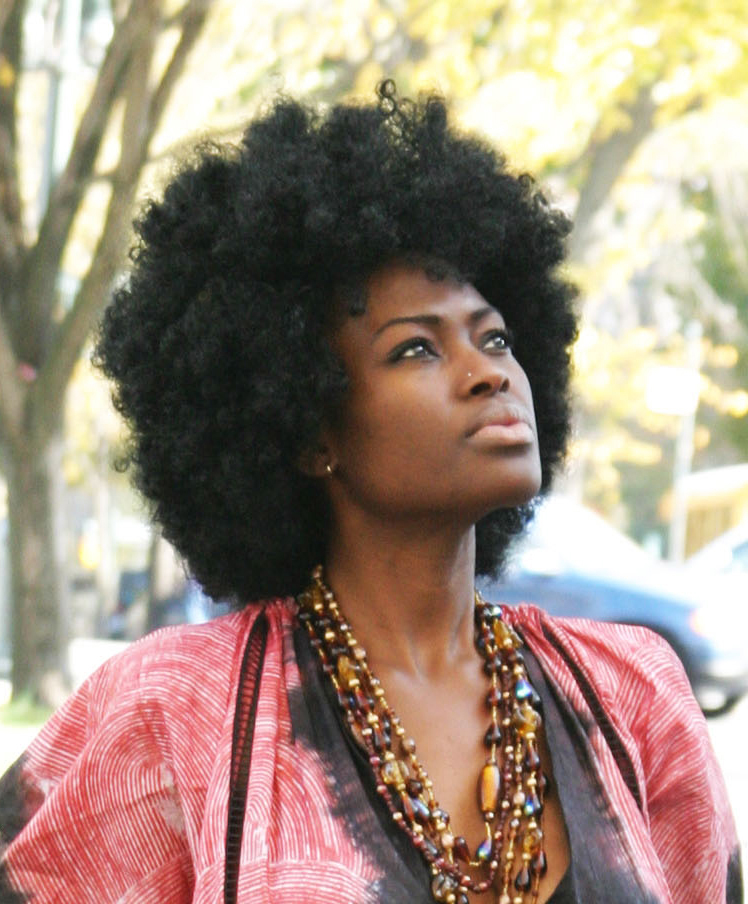When you engage in conversation with a poet, you might expect passionate words coupled with vivid imagery and wild metaphors. I had the chance to speak with Market of Dreams, author Ololade Siyonbola to discuss her career in poetry and her migration from Nigeria to the United States. I was very surprised by the genuine truth and realness Ololade Siyonbola brought to the conversation: a conversation spoken with truth, love and passion.
Parlé Magazine: When someone asks who Ololade is, what would you want them to know?
Ololade Siyonbola: I’m someone who speaks truth and speaks power. I’m a deeply spiritual person. I’m a very loving person. That’s most important to know.
Parlé: What was the hardest part of your migration to the US?
Ololade Siyonbola: It was tough because I didn’t fit in. I had a thick accent when I came to the United States. I had lived in London for a few years after I came from Nigeria and was very uppity. The kids just had their way and they just picked on me to no end. Because my parents were immigrants they weren’t present enough to say “this is how you deal with getting picked on.” They were struggling to get us into good schools and buy a house, so they weren’t present in a way that an American parent would have been and that was very tough. I always loved Nigeria and finding out that we weren’t going back was the shock of my young life.
Parlé: What was the reasoning behind your leaving?
Ololade: Well, just like most immigrants, Nigeria had a lot of violence and there was a lot of poverty. My mom came here to get an advanced degree and she just didn’t go back. It was just rough in Nigeria. Part of my family is well off and the other part is struggling. Even when you’re well off you have to provide your own water and light. It’s just unstable, unsafe and violent. My mom just wanted the best for us and she was willing to leave everything behind to make sure we would be safe.
Parlé: As an adult do you wish she hadn’t made that decision?
Ololade: I used to. I hadn’t been back until last December. So that’s about 21 years. I used to give my mother a hard time like, “why couldn’t you just leave us home. That’s our home. That’s our country.” And then I went to Nigeria last December and I was ashamed. I came back and I apologized to my mother. In spite of the fact that it has been twenty years, it’s gotten worse now. The gap continues to widen between the rich and the poor. So those who were there are worse off now than they would’ve been even twenty years ago. There’s just such a limit to opportunity and survival. Nigerians are so fierce and intelligent but all the odds are stacked against you when you live in that country.
Parlé: When you got to the US how were you received by African Americans?
Ololade: When I say the kids were making fun of me it was mostly black Americans. I think initially it was kind of a class thing, I think it was “she thinks she’s all that,” and we were living in the projects just like everybody else. People thought that I thought I was “all that” because I had this foreign accent. So I got a lot of flak for that but a lot of my closest friends were Black Americans. As I got more accustomed to the culture here and I started to understand peoples’ motivation, I was able to understand why people think and act the way they do. But my initial reception was not good.
Parlé: When you first began writing poetry was it something that came naturally to you or was it more of a struggle to get your words together?
Ololade: It took a while. I used to make up songs as a child, so that part came naturally but then in middle school I took a drama class and I would perform Maya Angelou and Langston Hughes. I just fell in love with the power of their words. I was really shy as a young person. So just getting into that performance space and becoming comfortable performing was a major shift for me. But I would always write. I would always journal. A lot of my best lines of poetry would come out while I was journaling. I remember listening to The Miseducation of Lauryn Hill and to me that album was poetry. And I said, “one day I have to write poetry like this. I have to get that much depth of knowledge. I have to write poetry that is deep and hip like Lauryn Hill but also ancient and classic like Maya Angelou, Langston Hughes, and The Bible.” So when I put the book together I had to go back and edit. This is like ten years of poetry so I had to go back to the old pieces and bring them up to a standard of what I see out there as the best. It took time but I think I got to a point where I was able to say, “I want the world to see this and experience this with me.”
Parlé: Why poetry to share your story over writing novels?
Ololade: Poetry can be music. I’m a big fan of Hip-Hop. It can be very intense. I’m a big Fugee/Lauryn Hill type of person. I love Hip-Hop. I love music. I think that you can say a lot more sometimes with poetry than you can with fiction. I also write fiction. I’m working on a fiction novel due out in a year, but with poetry I can just paint an image. I can paint it with three words. I can paint it with one hundred words, you know? It’s a lot more powerful and it gets straight to your gut.

Parlé: Through your work what do you aim to accomplish?
Ololade: My poetry is a collection of my stories, my experiences and things that I’ve learned along the way. I’m a deep thinker and I’ve experienced a lot more than the average 29 year old. Whether it is love, heartbreak, tragedy or enlightenment, I try to impart everything that I’ve experienced. I think in doing so the point is to send the message of loving yourself and loving your neighbor. People always say to me that they’re inspired by the words of the book. They’re motivated. They’re so proud to be Black. Primarily I want people to look within and to see the beauty and the power that they have. The Market of Dreams is life. Life is a market of dreams. We choose to be happy or to be sad. We choose the friends that we want. We choose our situations to a large extent. We have a lot more control over our circumstance than we give ourselves credit for. It’s about taking control and taking charge of that inner power. It’s about using that power wisely to be a blessing and to be powerful while we’re here, doing what we are put here to do, to fulfill our purpose and to find true infinite joy within. So I hope people are inspired and that they walk away with a sense of empowerment more than anything else.
Parlé: Do you get nervous before you perform or release your work to the public?
Ololade: I’m excited. I’m very excited. You know, the nerves went away when I realized that I’m doing exactly what I’m supposed to be doing. I am fulfilling my purpose by sharing these truths and sharing these words because they bless people. So I don’t get nervous anymore. I get on stage, I take a deep breath and get into a calm place and just spit fire. It feels so good that I don’t even have time to be nervous because I’m just so excited.
Parlé: What’s one of your favorite poems to perform?
Ololade: Number one is ‘Cross Continental Black Nation.’ That’s probably my most frequently performed piece. That’s a piece that speaks to every single Black person, every person with a little bit of brown in them. Anybody who even loves Black people, whatever race they may be, because it’s a poem about freedom, the Black race and the joy of the Black race. It’s about the emancipation that we will eventually experience, that goes beyond all of the things that we’re [currently] experiencing when you look at young boys being killed in Brooklyn and police brutality and poverty. In Yoruba we say that every suffering has an expiration date and I believe that nothing lasts forever. So that poem is about that day when we will see no more of this suffering and the fact that in order to get there, all we have to do is love each other, treat each other as family and understand our history. Inevitably we will be free. The other poem that I love to perform is the title piece which is ‘Market of Dreams.’ That one is just a celebration. If you read that poem it should bring to mind just gorgeous colorful images of a market that has gold and amber, but also has the darkness that we run away from. In speaking that poem I’m saying to people to reach for the stars. Reach for the good that you want in this life. Take it. Be the best that you can be. Be the love that you want. Be the change that you want to see in this world. Do what you were put here to do. Be yourself. Be fully you. And people always love to hear both of those pieces.
Parlé: It seems you have a sense of obligation, would you agree?
Ololade: I have a sense of purpose. I’m very clear about why God put me here on Earth. I do, I feel very obligated to my people. To open our eyes to help us to look in the mirror and love what we see and to help us to look at each other and love what we see. I think that self-hatred is what is killing a lot of us in so many different dimensions. So I have an obligation to share that story of love and power. It’s a universal story also. It’s a blessing to black people but I think that all people need to find a way to love themselves fully.
Parlé: What was the process of finding your purpose?
Ololade: I’ll make that as short as I possibly can. Like I said, I’m a very spiritual person so I pray a lot. Even as a child, I don’t know if it was my mother who sat me down and told me, “there is a God and if you talk to God he will listen,” but I’ve always been deeply spiritual. I graduated college and traveled around the country just doing all kinds of stuff. I was just having a ball and being poor. I spent some time in Miami actually and I had a very powerful, spiritual experience where I just came to know God. I remember getting all these visions of what I was supposed do with my life. I would have these same dreams over and over again-dreams about going back to Africa and blessing children. That was the same time period that I found out that I really was a poet and I really had a lot of poetry in me. This was a period where I was writing poetry every single day, and according to my peers it was amazing poetry. I came to understand that I had to speak life and love and power to my people but I also had to revive this energy around knowing Africa, and knowing where we came from and valuing and loving where we came from because it’s beautiful. I learned a lot in that time period. I continue to learn. I think that all of us have something that gets us more excited than anything else that we do. There’s always something that gets you so amped up that it could never feel like work. If you’re doing it 24/7 it doesn’t feel like work. Whether it’s dancing or writing or public speaking or basketball, we all have something that we love so much. Knowing that is the beginning of finding your purpose. We’re put in the system where we have to work nine to five and go to school to fit in this systems, so we don’t get a clear understanding of our purpose and we don’t really get a full understanding of what we are passionate about. It varies. Everyone has a different purpose, but we all have a purpose and finding that joy is the beginning of finding your purpose.

Parlé: How has Market of Dreams been received thus far?
Ololade: I perform at different venues every weekend and people buy the book, it’s available online also. They’re just moved. I’m always amazed by the response because I’m just doing what I’m supposed to do. People cry and are very inspired and very appreciative. They always come to thank me for the words. They tell me that, they’re so proud to be Black. That’s just the tip of the iceberg of what I want people to get out of it. I think it’s been very well received. The painting on the cover was chosen because I saw a market in that painting. But I also saw African history. The front of the book illustrates that Market of Dreams because it’s gold and colorful. It’s powerful. It’s rich. On the back you have the images of pharaohs and pyramids. For me, I’m saying that we should choose the best of this market, which is life. One of the ways to get that is to know ourselves and know where we came from and know about that ancient history and what we’ve given to the world. You cannot be a Black person and dislike yourself. You cannot gun down another brother in the street, if you know that you are a god. You’re a king. You are powerful. There is no need for you to hurt yourself or anybody else if you know how amazing you are. So that is really the message of the book.
Parlé: What do you plan of releasing following Market of Dreams?
Ololade: I’m working on a fiction novel right now. The working title is The President’s Daughters. It’s a story about what happens in a small African country when a young new leader is elected. He basically transforms the country over night. It’s a war torn country and we see the violence just stop. We see women educated. We see poverty eradicated in this story. One of the things I’ve learned on this journey is that the best way to change the status quo is to work on a new status quo. Work on a new vision. This book is really a vision of what it would be like to be free. It’s like a case study, if you will, of one country of Black folks who really just shed all of these vices that we are so plagued by.
Parlé: If you had to choose one thing that you want people to take from your work, what would it be?
Ololade: Know yourself. Get to know yourself and your purpose. Know that you are amazing and that you are powerful. There is nothing that you cannot do. Value yourself. Do what it is that you were put here to do and do it well.
Parlé: Is there anything else you’d care to share with others?
Ololade: The only thing I would say is that I know we tend to forget about poetry. Reading books is a novelty to some people. But we don’t always value poetry. When I put the book together, I put it together with that in mind. With the understanding that most people are intimidated by poetry and a lot of times poetry is considered boring. I put it together in such a way that it’s accessible. The metaphors are powerful and deep but you can get them even if you’re not some literary scholar. People like Nikki Giovanni and Maya Angelou have added so much to our culture and to our struggle. I think it’s important that we get to know poetry again. When we look at people like Talib Kweli and Lauryn Hill, they are poets and are putting that poetry to a beat. I think people should get to know poetry all over again because it is way more powerful than you’d realize.
At the end of the interview, Ololade recited her book’s title piece, ‘Market of Dreams.’ Through her words and the poem’s verses Ololade painted beautiful images, exuding the passion she intends to share with others, as well as the inspiration she hopes those who come across her work will find.
Also Check Out:
Tamika Newhouse – Self-Made Author & Motivational Speaker
Real Wifey Hustle: Author Meesha Mink Continues Her Unique Brand of Urban Fiction
French Montana Interview – Rise From Cocaine City
Author Lendy Demetrius Returns To Storytelling With Urban Tale

